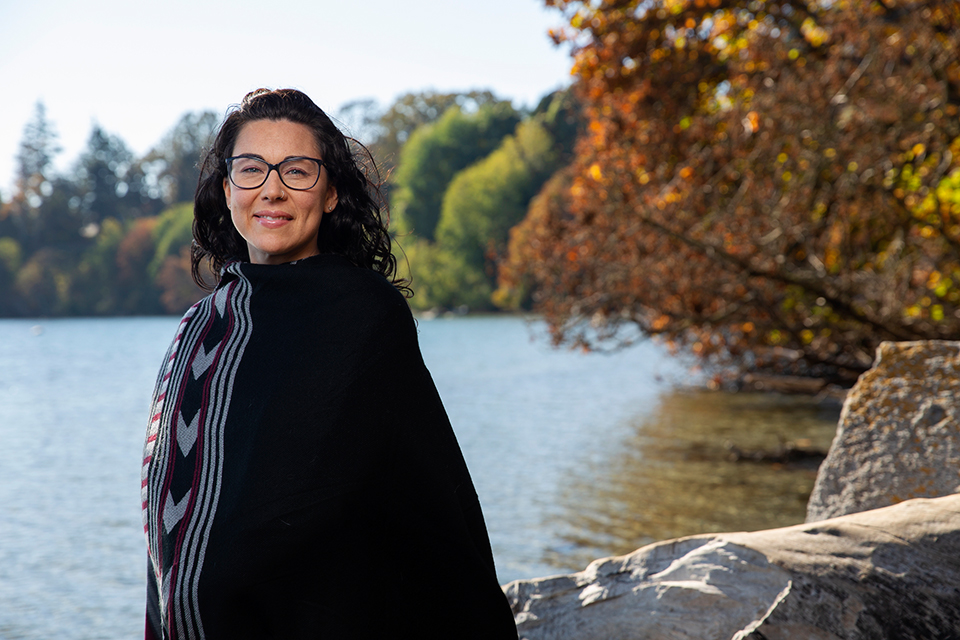Indigenous languages in a time of crisis: lessons in hope
- Jody Paterson

In another time, Onowa McIvor would have learned the language of her ancestors from her mother, who in turn would have learned it from her parents, back through the generations. That personal truth has fed McIvor’s passion for the revival of Indigenous languages in Canada for more than 20 years.
McIvor’s vital contributions to this important field of research have now earned her the prestigious President’s Chair, the highest academic honour the University of Victoria can bestow on a faculty member, replacing Distinguished Professorships at UVic. She is the third person to receive the award, which was created to recognize faculty who have achieved great distinction in research and research-inspired teaching; made substantial contributions to UVic and the wider community; and champion the pursuit of excellence in research, teaching and community-university engagement.
UVic has a longstanding commitment to working with communities on Indigenous language revitalization, and the impact of revitalized language in communities is profound. Onowa McIvor’s work is inspiring and uplifting, and we are so fortunate to have a researcher and teacher of her calibre at UVic.
—Jamie Cassels, UVic President
McIvor, an associate professor in UVic’s Department of Indigenous Education, says she’s honoured to have been chosen for the President’s Chair. But she acknowledges some discomfort with the way awards single out one person for recognition, when in fact the work of Indigenous language revitalization and Indigenous culture overall is so much about the wisdom and efforts of the collective.
“It’s difficult for us, being asked to put our names forward for something,” she says. “I know my students feel that discomfort, too, but they’re also going to need to put their names forward, for scholarships and other opportunities.
“I tell them that when you put your name forward, you bring attention to the issue you care about. You draw the light to it. That’s a powerful thing. If I can be of service in bringing Indigenous language revitalization to more people’s attention by putting myself forward, then that’s OK.”
One mind, one people
McIvor’s multifaceted work to revive Indigenous languages has taken many forms, from researching adult language learning programs in Indigenous communities to co-creating an open-source language assessment tool.
She currently co-leads a $2.5 million national project to support and expand language revitalization efforts across Canada. NEȾOLṈEW̱—“one mind, one people” in the SENĆOŦEN language—is a SSHRC-funded collaboration with nine Indigenous partners in six provinces.
“This work is very near and dear to my heart, very personal. That’s the case for virtually everyone who works in Indigenous language revitalization,” says McIvor, who is maskiko-nehiyaw (Swampy Cree) and Scottish-Canadian.
All Canadians benefit from the continuation and celebration of Indigenous languages as the country works to reconcile its difficult and troubled history with Indigenous peoples, McIvor adds.
Indigenous languages are filled with beauty, like great works of art, and hold much wisdom through philosophical views, cultural values and ways of living.
—Onowa McIvor, UVic President's Chair
Shifting the narrative
McIvor recalls that in her early years of study, the public discourse around Indigenous languages was mostly around mourning for what was being lost. Media coverage at that time tended to be limited to occasional stories marking the death of an elder who had been the last sole speaker of a particular language. “The narrative in the 1990s was all about dying languages,” she says.
These days, the work comes from a much more hopeful perspective.
We’re looking at where language revitalization is working, and the impact it’s having on people’s lives. We’re not ignoring the concerns about language speakers passing on, because that’s still happening. But even when it does, you can still look at the legacy of the person, the young people they connected to and influence they had before they died. It really is a pedagogy of hope.
—Onowa McIvor, UVic President's Chair
A growing government commitment to language revitalization is evident at both the federal and provincial levels, adds McIvor. In 2018, the BC government allocated $50 million over three years to help revitalize Indigenous languages, a significant jump in spending over the $1 million a year that had been typical to that point, she says.
Since 2016, the federal government has increased its spending as well, and last year introduced the Indigenous Languages Act. The act envisages a collaborative partnership with Indigenous peoples to reclaim, revitalize, maintain and strengthen Indigenous languages in Canada.
Spirit of collaboration
A collaborative partnership on all fronts will be essential to success, says McIvor. Language revitalization has to be led by Indigenous peoples, “but we can’t do it alone.”
“We didn’t get into this on our own, and we won’t get out of it on our own, either,” she says. “We need people with skills to lend to this work. We need funding. We absolutely need allies.”
The COVID pandemic is having its own surprising impact on language revitalization, as McIvor and her research team discovered in a short study this summer.
Switching to online platforms wasn’t easy for language learning activities that were almost always done in person, says McIvor. But at the same time, that switch brought in more learners from distant locations who were suddenly able to access language classes for the first time.
As the pandemic shook people into taking stock of what mattered most in their lives, many reached to their culture to ground themselves.
What we have noticed is more people turning to our languages in this time of crisis. There is comfort there.
—Onowa McIvor, UVic President's Chair

